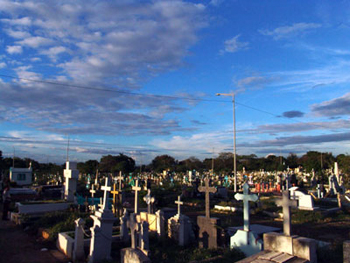the immortal
El Inmortal
The Immortal
Nicaragua / Mexico / Spain 2005
reĹľija/directed by
Mercedes Moncada RodrĂguez
scenarij/screenplay
Mercedes Moncada RodrĂguez
fotografija/cinematography
Javier MorĂłn Tejero
montaĹľa/editing
Viviana GarcĂa,
Mercedes Moncada RodrĂguez
zvok/sound
Luis Arau Verdayes
igrajo/cast
Reina, MarĂa, JosĂ© und Juan Antonio Rivera
producenti/producers
AarĂłn Fernández Lesur, Mercedes Moncada RodrĂguez, Puy Oria,
Montxo Armendáriz
produkcija/production
Chango Films (Mexico City), Cinta Negra Producciones, Oria Films (Madrid)
format/format
35mm, barvni/ color
dolĹľina/running time
78′
prodaja/world sales
The Film Sales Company
Andrew Herwitz
443 Greenwich Street
Suite 5A
New York, NY 10013
USA
Tel.: (1-212) 625 0535
Fax: (1-212) 625 0534
andrew.herwitz@filmsalescorp.com
festivali, nagrade (izbor)/festivals, awards (selection)
Sundance 2005

The life of the Rivera family changed on April 3, 1983.
At 6 a.m. that morning, as their mother was making breakfast, they heard shots; they were used to hearing gunfire,
but this time the shots were a lot closer. Their home was
caught in the middle of a skirmish between the Contras
and the Sandinistas. The Contras arrived and seized Juan
and José, both 13 years old, Emilio, 14 years old, and
Reina, 15, along with their father. Their mother begged
the fighters to leave at least one child, but they refused.
The unit had already started to leave with all of them, and
Juan fell behind a little. His mother caught up with him
and told the troops that if they wanted the child, they
would have to kill her. Juan stayed with his mother. The
Contras burned the house down.
It is the story of a family that was torn apart by a war,
which split up the brothers and placed them on opposite
sides. The end of the armed conflict allowed the family
members to return to an impoverished country. As they
attempt to overcome the memories of war wounds, of the
deaths that burden their recollections, of the guilt and the
mutual hatred, they are confronted by a disintegrating social
fabric that continues to drive them apart.
The Rivera family shows how division, religious manipulation,
male chauvinism and poverty are part of what the
war left behind in Nicaragua.
El Inmortal
The Immortal
Nicaragua / Mexico / Spain 2005
reĹľija/directed by
Mercedes Moncada RodrĂguez
scenarij/screenplay
Mercedes Moncada RodrĂguez
fotografija/cinematography
Javier MorĂłn Tejero
montaĹľa/editing
Viviana GarcĂa,
Mercedes Moncada RodrĂguez
zvok/sound
Luis Arau Verdayes
igrajo/cast
Reina, MarĂa, JosĂ© und Juan Antonio Rivera
producenti/producers
AarĂłn Fernández Lesur, Mercedes Moncada RodrĂguez, Puy Oria,
Montxo Armendáriz
produkcija/production
Chango Films (Mexico City), Cinta Negra Producciones, Oria Films (Madrid)
format/format
35mm, barvni/ color
dolĹľina/running time
78′
prodaja/world sales
The Film Sales Company
Andrew Herwitz
443 Greenwich Street
Suite 5A
New York, NY 10013
USA
Tel.: (1-212) 625 0535
Fax: (1-212) 625 0534
andrew.herwitz@filmsalescorp.com
festivali, nagrade (izbor)/festivals, awards (selection)
Sundance 2005

The life of the Rivera family changed on April 3, 1983.
At 6 a.m. that morning, as their mother was making breakfast, they heard shots; they were used to hearing gunfire,
but this time the shots were a lot closer. Their home was
caught in the middle of a skirmish between the Contras
and the Sandinistas. The Contras arrived and seized Juan
and José, both 13 years old, Emilio, 14 years old, and
Reina, 15, along with their father. Their mother begged
the fighters to leave at least one child, but they refused.
The unit had already started to leave with all of them, and
Juan fell behind a little. His mother caught up with him
and told the troops that if they wanted the child, they
would have to kill her. Juan stayed with his mother. The
Contras burned the house down.
It is the story of a family that was torn apart by a war,
which split up the brothers and placed them on opposite
sides. The end of the armed conflict allowed the family
members to return to an impoverished country. As they
attempt to overcome the memories of war wounds, of the
deaths that burden their recollections, of the guilt and the
mutual hatred, they are confronted by a disintegrating social
fabric that continues to drive them apart.
The Rivera family shows how division, religious manipulation,
male chauvinism and poverty are part of what the
war left behind in Nicaragua.

